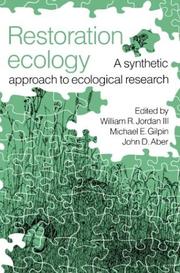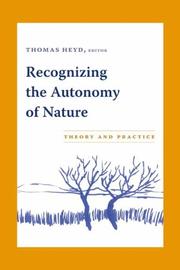| Listing 1 - 7 of 7 |
Sort by
|
Article
Year: 1996
Abstract | Keywords | Export | Availability | Bookmark
 Loading...
Loading...Choose an application
- Reference Manager
- EndNote
- RefWorks (Direct export to RefWorks)
restoration ecology --- university --- experimental ecology --- Wisconsin --- arboretums

ISBN: 0520928482 9780520928480 0520233204 9780520233201 Year: 2003 Publisher: Berkeley
Abstract | Keywords | Export | Availability | Bookmark
 Loading...
Loading...Choose an application
- Reference Manager
- EndNote
- RefWorks (Direct export to RefWorks)
Ecological restoration, the attempt to guide damaged ecosystems back to a previous, usually healthier or more natural, condition, is rapidly gaining recognition as one of the most promising approaches to conservation. In this book, William R. Jordan III, who coined the term "restoration ecology," and who is widely respected as an intellectual leader in the field, outlines a vision for a restoration-based environmentalism that has emerged from his work over twenty-five years. Drawing on a provocative range of thinkers, from anthropologists Victor Turner, Roy Rappaport, and Mary Douglas to literary critics Frederick Turner, Leo Marx, and R.W.B. Lewis, Jordan explores the promise of restoration, both as a way of reversing environmental damage and as a context for negotiating our relationship with nature. Exploring restoration not only as a technology but also as an experience and a performing art, Jordan claims that it is the indispensable key to conservation. At the same time, he argues, restoration is valuable because it provides a context for confronting the most troubling aspects of our relationship with nature. For this reason, it offers a way past the essentially sentimental idea of nature that environmental thinkers have taken for granted since the time of Emerson and Muir.
Restoration ecology. --- animal population. --- biological diversity. --- communion with nature. --- community. --- conservation. --- ecology. --- ecosystem. --- environment. --- environmentalism. --- flora and fauna. --- habitat. --- humans in nature. --- indigenous culture. --- indigenous people. --- invasive species. --- landscape. --- meditation. --- natural world. --- nature. --- nonfiction. --- plains. --- plants. --- prairies. --- reinhabitation. --- reintroduction. --- relationship with nature. --- relaxation. --- restoration ecology. --- restoration. --- science. --- spirituality. --- tidal marsh. --- vegetation. --- wetlands. --- wild animals. --- wilderness.
Article
Abstract | Keywords | Export | Availability | Bookmark
 Loading...
Loading...Choose an application
- Reference Manager
- EndNote
- RefWorks (Direct export to RefWorks)

ISBN: 0521331102 0521337283 9780521337281 9780521331104 Year: 1996 Publisher: Cambridge: Cambridge university press,
Abstract | Keywords | Export | Availability | Bookmark
 Loading...
Loading...Choose an application
- Reference Manager
- EndNote
- RefWorks (Direct export to RefWorks)
Nature conservation --- Reclamation of land --- Restoration ecology --- Nature --- Améliorations foncières --- Réhabilitation (Ecologie) --- Conservation --- Restoration ecology. --- Reclamation of land. --- Land, Reclamation of --- 502.37 --- 574 --- 574 General ecology. Biocoenology. Hydrobiology. Biogeography --- General ecology. Biocoenology. Hydrobiology. Biogeography --- 502.37 Restoration, salvage, rescue measures. Sanitation --- Restoration, salvage, rescue measures. Sanitation --- Conservation of nature --- Nature protection --- Protection of nature --- Conservation of natural resources --- Applied ecology --- Conservation biology --- Endangered ecosystems --- Natural areas --- Land melioration --- Land reclamation --- Melioration of land --- Land use --- Shore protection --- Ecological restoration --- Ecosystem restoration --- Rehabilitation ecology --- Restoration of ecosystems --- Nature conservation. --- Meetings --- Natural resource conservation --- Restauration écologique.
Digital
ISBN: 9781610910422 Year: 2011 Publisher: Washington, DC Island Press/Center for Resource Economics
Abstract | Keywords | Export | Availability | Bookmark
 Loading...
Loading...Choose an application
- Reference Manager
- EndNote
- RefWorks (Direct export to RefWorks)
Nature protection --- General ecology and biosociology --- Environmental protection. Environmental technology --- landschapsecologie --- milieubeleid --- natuurbescherming --- ecosystemen --- milieubescherming
Book
ISBN: 9781610910422 Year: 2011 Publisher: Washington DC Island Press/Center for Resource Economics Imprint Island Press
Abstract | Keywords | Export | Availability | Bookmark
 Loading...
Loading...Choose an application
- Reference Manager
- EndNote
- RefWorks (Direct export to RefWorks)
Making Nature Whole is a seminal volume that presents an in-depth history of the field of ecological restoration as it has developed in the United States over the last three decades. The authors draw from both published and unpublished sources, including archival materials and oral histories from early practitioners, to explore the development of the field and its importance to environmental management as well as to the larger environmental movement and our understanding of the world. Considering antecedents as varied as monastic gardens, the Scientific Revolution, and the emerging nature-awareness of nineteenth-century Romantics and Transcendentalists, Jordan and Lubick offer unique insight into the field's philosophical and theoretical underpinnings. They examine specifically the more recent history, including the story of those who first attempted to recreate natural ecosystems early in the 20th century, as well as those who over the past few decades have realized the value of this approach not only as a critical element in conservation but also as a context for negotiating the ever-changing relationship between humans and the natural environment. Making Nature Whole is a landmark contribution, providing context and history regarding a distinctive form of land management and giving readers a fascinating overview of the development of the field. It is essential reading for anyone interested in understanding where ecological restoration came from or where it might be going.
Nature protection --- General ecology and biosociology --- Environmental protection. Environmental technology --- landschapsecologie --- milieubeleid --- natuurbescherming --- ecosystemen --- milieubescherming


ISBN: 9780231509800 9780231136068 0231136064 Year: 2005 Publisher: New York, N.Y. Columbia University Press
Abstract | Keywords | Export | Availability | Bookmark
 Loading...
Loading...Choose an application
- Reference Manager
- EndNote
- RefWorks (Direct export to RefWorks)
"How do the ways in which we think about and describe nature shape the use and protection of the environment? Do our seemingly well-intentioned efforts in environmental conservation reflect a respect for nature or our desire to control nature's wildness? The contributors to this collection address these and other questions as they explore the theoretical and practical implications of a crucial aspect of environmental philosophy and policy - the autonomy of nature. In focusing on the recognition and meaning of nature's autonomy and linking issues of metaphysics, epistemology, ethics, and policy, the essays provide a variety of new perspectives on human relationships to nature."--Jacket.
Biology --- Environmental ethics --- Ethique de l'environnement --- Environmental ethics. --- Éthique de l'environnement.
| Listing 1 - 7 of 7 |
Sort by
|

 Search
Search Feedback
Feedback About UniCat
About UniCat  Help
Help News
News